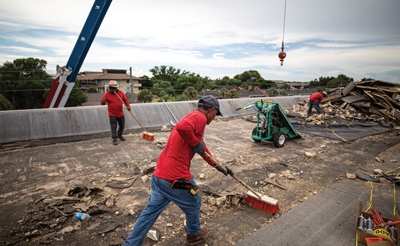
A More Thorough Approach—Multi-year Budgeting
By Target Roofing & Sheet Metal / Published January 2021

In 2021, your association’s operating budget may include repainting the clubhouse, resurfacing the tennis courts, or repairing broken sprinkler heads. Generally, those are planned costs that can be absorbed into the annual budget using monthly or yearly dues. What about large expenses, like replacing a roof, swimming pool, or even an entire building? Reserves likely cannot cover those costly improvements.
Multi-year budgeting is a solid fiscal strategy, but it requires a more thorough approach to planning than just stashing money in a reserve fund. You need to know what big expenditures are on the way, when they’re needed, and how much they’re going to cost.
A roof replacement, for example, can cost tens of thousands of dollars and potentially upwards of $100,000 or more if it’s a large property. Some association boards opt to levy special assessments to generate the extra money. That decision is nearly universally opposed by residents and tenants. The lack of proactive planning can be a fiscal nightmare.
Target Roofing & Sheet Metal has helped hundreds of property owners, property managers, and associations create multi-year financial plans that budget for roof replacements. That same process can be used for major facility repairs and additions. Below is a guide to getting started.
The Budgeting Process
Annual budgeting is terrific for predictable expenses like utilities, insurance, taxes, and landscaping. Budget spreadsheets also show revenue from rent or leases, dues, and sales. Generally, there is a reserve fund that covers unexpected projects, like a sewer or plumbing repair. Major unexpected expenses, such as a hurricane, fire, or flooding, will be covered by insurance.
Multi-year budgeting is a challenge because it can be difficult to forecast revenue and expenses three to five years down the road. No one can accurately predict when an HVAC system, for instance, will malfunction. It is incredibly important to conduct a thorough property inventory of all tangible assets, noting manufacturing and installation dates, service records, and warranty information. Industry experts will need this information to help you create a long-range budget plan.
Regular Inspections
Vehicles have a limited manufacturer warranty, generally a five-year, 60,000-mile warranty that covers parts and labor. A well-maintained vehicle can last well beyond five years, but drivers don’t necessarily know if that’s six years, eight years, or more. An experienced mechanic, however, can offer a qualified opinion.
 A roof should be inspected at least twice annually. The first inspection before the rainy season can catch potential areas of concern. Another inspection after the rainy season can see how well a roof weathered the storms. Certified inspectors will look for cracks or chips in tiles, displaced or buckled shingles, missing screws and nails, evidence of pooled water or drainage issues, mold and algae growth, damaged flashing, rust, and more.
A roof should be inspected at least twice annually. The first inspection before the rainy season can catch potential areas of concern. Another inspection after the rainy season can see how well a roof weathered the storms. Certified inspectors will look for cracks or chips in tiles, displaced or buckled shingles, missing screws and nails, evidence of pooled water or drainage issues, mold and algae growth, damaged flashing, rust, and more.
Regular inspections lead to regular maintenance, which helps prolong the life of a roof. If a building lasts 60 years, you might need to replace the roof twice. Imagine the cost savings if you only need to replace it once at the 30-year mark.
A qualified roofing inspector can provide necessary information in forming a strategic plan for long-range repairs with a detailed “state of the roof” assessment and documentation, as well as recommendations for repairs.
Replacement Timeline
No two roofs are the same. Roofs that are installed by licensed, skilled contractors according to a manufacturer’s exact specifications will last longer, just like roofs that are well-maintained.

It is difficult to predict in year one whether a roof will last 20, 30, or 40 years. At year 10, experienced roofing professionals will begin to have an idea how the roof is holding up. At year 15, they might have a grasp of whether a roof has five or 10 good years left. This is the point you want to start thinking about a roof replacement, rather than having a contractor spring the bad news that you need a new roof ASAP.
How can inspectors predict a roof’s remaining life? Experience. They know how Florida’s climate impacts a roof. They’re familiar with the major manufacturers and know which brands hold up well past their warranty. They will take high-definition photos during each visit to document a roof’s condition and compare images from year to year to note any changes.
Project Estimate
Fiscally sound associations will request several written estimates before signing on the dotted line. Those estimates typically have a short window of validity to account for market changes, like rising labor or material costs. It’s much more difficult to nail down the cost of a roof replacement in 2026 because so many variables come into play. However, an experienced roofing contractor can at least get you in the ballpark. Request a non-binding, projected budget estimate rather than a quote.
Once you know when a roof will need to be replaced and a ballpark figure of the costs, it’s time to start saving. Payment policies vary from contractor to contractor. Many require a flat fee or percentage of the total project cost in advance, as well as regular payments during construction. Others send a large bill upon completion, and some will create a payment plan with terms that resemble a loan. The key is making sure you’ll have the cash on hand each time a bill arrives in the mail.
Plan for the expected
Major expenses like a new roof should not come as a surprise. Every roof will need to be replaced at some point. That’s a fact of life in Florida as the three H’s—heat, humidity and hurricanes—take their toll over time in the Sunshine State.
Knowing whether that roof replacement will happen in 2021, 2026, or 2031 is incredibly important for budgeting purposes. Begin planning for a replacement from day one but start closely evaluating costs versus savings with about 5 to 10 years left on a roof’s estimated life. Multi-year budgeting just turned that unexpected expense into an expected one.
Target Roofing & Sheet Metal
Target Roofing & Sheet Metal is a licensed and insured commercial roofing specialist headquartered in Fort Myers. For more information, please visit TargetRoofers.com or call (239) 334-7496.




